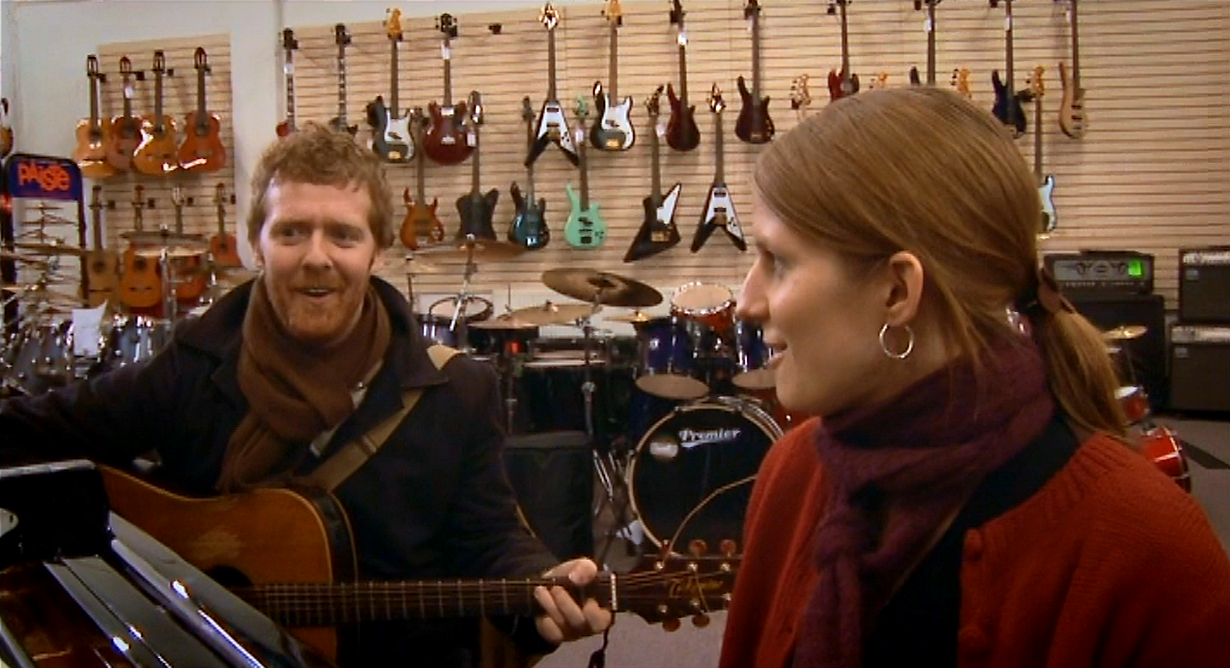Musicals usually have a ceiling associated with them. By characters breaking out in song, the stories usually have a fantastical element, which serves to limit the amount of character growth any one character can experience, since the world does not operate the same in musicals. In short, musicals are never grounded in reality: until now. Once is the sort of genre changing movie that creates a new standard for the musical going forward. By eliminating the lavish sets, costumes, and other fantasy elements of traditional musicals, director John Carney has crafted a musical grounded in reality where the songs organically rise and support the beautiful love story between a guy (Glen Hansard) and girl (Marketa Irglova). It successfully merges the fantasy of a musical with the real world.
The story is not complex: a street performer (Hansard), struggling to make ends meet, encounters a flower salesman (Irglova), a single mother with a similar economic situation. Sharing a love for the guy’s music, the two strike up a bond that helps propel them out of the rut their lives have been stuck in.
The songs themselves do not require story progression to cease in Once. By setting up the fact that the characters can truly express their feelings through song, Once allows the songs to organically pop up and service the story and characters, not the other way around as is usually the case for musicals. There are no top hats, bright stages, or dance numbers. Busby Berkeley would be shocked that his musicals are lumped in with this film. Most importantly, with the songs occurring throughout Once, it gives the love story a lyrical feel, as if a song could manifest itself into a movie.
The love story is not as straightforward either. Both main characters have lots of baggage that keep them from just acting on their feelings. The guy has a former girlfriend that has broken his heart and he is not quite over. The girl has a family and a husband at home. The worlds that these two come from keep them from expressing their desire in a normal setting; this tension gives the songs more force; it allows the characters to express to each other how they truly feel without compromising the other people in their lives that the guy and girl care about. In most musicals, the songs are elaborate fantasies about a characters desires. In Once, the songs are the fantasy themselves: they let the characters show their love to each other.
Musical numbers also service musicals as the part of the story that people will tell their friends about. Once has plenty of these moments, but they are more subtle. The first song, Falling Slowly, is a beautiful duet for the main characters. However, the signature moment is when the store owner ignores what he is doing and wordlessly starts listening to the beautiful song. That wordless response appears a few times in the story, and like us, gives a glimpse behind the curtain of something real and special happening. The single cam, at first a little shaky, also provides and intimate feel to the story to give it a more personal touch and emotional resonance.
Of course, the story is shouldered by the two leads. A great deal is asked of Glen Hansard and Marketa Irglova (who are both singers by trade and had little to no acting experience). Fortunately, they are up to the task. Half of the movie is signing, which they can do (the songs are actually performed by the two), and the other half is catered to the backgrounds of the people portraying the characters in Once. Their connection is palpable, and with each passing song we really want these two to end up together. The other characters in the story are around enough to service the two main characters, and provide some texture to the two lead’s lives.
Musicals are supposed to showcase character emotions and feelings through the songs that they sing. Once strips away what musicals have become and takes the genre to its roots. It is a beautiful story with beautiful characters and beautiful songs. Once is an apt title: a movie like this usually only comes along once.

